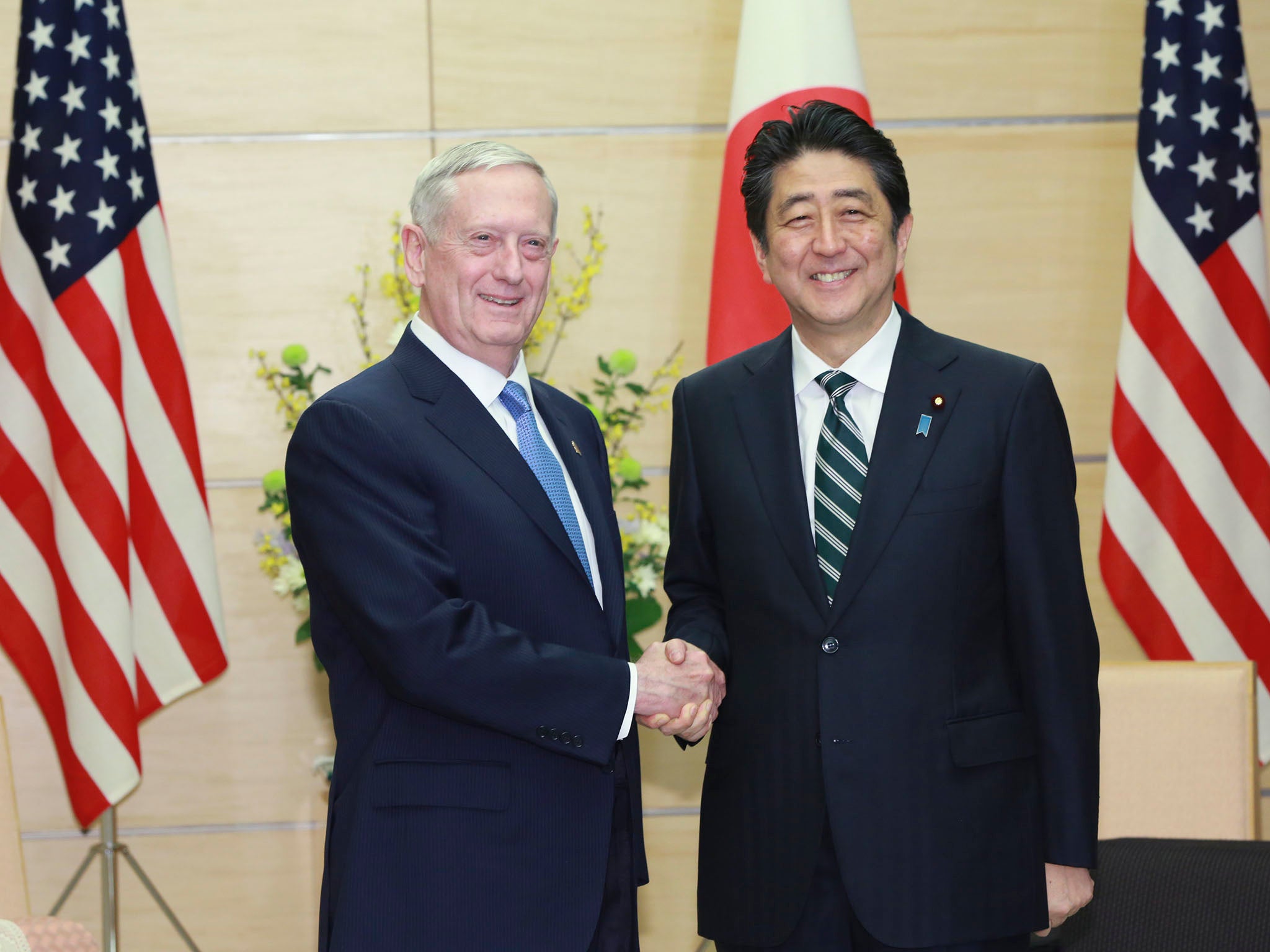China accuses US of putting regional stability at risk over backing of Japan in island dispute
The Senkakus are claimed by Japan but contested by China, which calls them the Diaoyu islands

China has accused the US of compromising the stability of the Asia-Pacific region after Donald Trump’s Defence Secretary confirmed Washington would back Japan if a conflict arose with Beijing over a number of disputed islands.
James ‘Mad-Dog’ Mattis, Mr Trump’s controversial pick for the sensitive post, caused a stir with his comments during a two-day visit to Japan where he held talks with Prime Minister Shinzo Abe.
The uninhabited islands in the East China Sea, surrounded by potentially lucrative natural gas deposits and abundant fishing grounds, are controlled by Japan but contested by China.
During his trip Mr Mattis claimed the Senkakus falls within the remit of the Japan-US security treaty, under which Washington is obliged to defend all areas under Tokyo’s administrative control.
The retired marine general, who served in Korea and Japan, said: “I want to make certain that Article 5 of our mutual defence treaty is understood to be as real to us today as it was a year ago, five years ago – and as it will be a year, and 10 years, from now.”
He stated that the US opposed any unilateral action which would undermine Japanese control of the islets, which China refers to as the Diaoyu islands.
Mr Mattis also reiterated the importance of free navigation in the strategic waterway.
But his comments angered Beijing, who released a statement calling on Washington to stop issuing “wrong information” and risk further complicating the delicate issue, bringing “instability to the regional situation”.
In a meeting with his Japanese counterpart, Tomoni Inada, Mr Mattis declared the two countries alliance was the “cornerstone” of regional stability.
He said: “I want there to be no misunderstanding during the transition in Washington that we stand firmly, 100% shoulder-to-shoulder with you and the Japanese people.”
The comments echoed his own statement made earlier in the week in Seoul, following a four-day visit to Japan and South Korea where, referencing North Korea, he said: “Right now we have to address the reality of the threat that your country and my country faces and we intend to be shoulder-to-shoulder with you as we face this together.”
Mr Mattis visited the region in his first trip abroad in his new role, widely viewed by many as offering reassurances to the US’ allies in the region.
He praised his host country, saying: “Japan has made noteworthy contributions to regional security and to the alliance, and the United States deeply appreciates Japan’s contributions.”
The Commander-in-Chief ruffled feathers during his presidential campaign, where he criticised Japan and South Korea’s commitment to their US alliance.
He hinted at withdrawing military backing unless more funds were pumped into the costs of housing American soldiers, of which there are roughly 28,500 in South Korea and 47,000 in Japan.
Mr Mattis’ trip appeared to allay fears, stating he saw “no need” for US military intervention in the South China Sea.
But Mr Trump has signalled a fresh direction in foreign policy towards China, who he has accused of inventing climate change and manipulating its currency to profit its own interests.
In his earlier visit to South Korea Mr Mattis announced a missile defence system, known as terminal high-altitude area defence (Thaad), would be deployed in the country later this year in a bid to combat the growing threat from Pyongyang.
This was heavily criticised by China, who accused it of altering the power balance in the region.
Chinese foreign ministry spokesman, Lu Kang, said: “We have resolute opposition to the deployment of Thaad to South Korea by the US and ROK [South Korea].
“Such actions … will jeopardise security and the strategic interests of regional countries, including China, and undermine the strategic balance in the region.”
Join our commenting forum
Join thought-provoking conversations, follow other Independent readers and see their replies
Comments
Bookmark popover
Removed from bookmarks